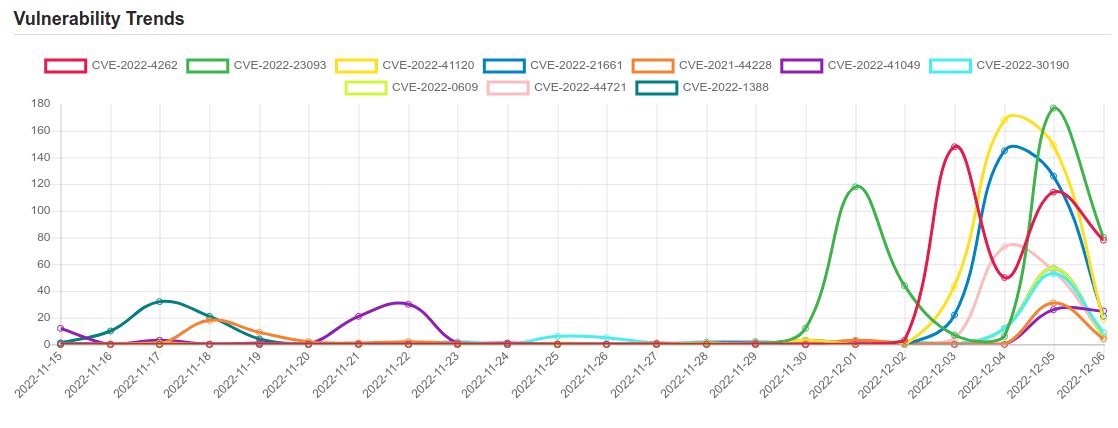Daily Vulnerability Trends: Wed Dec 07 2022

| CVE NAME | CVE Description |
| CVE-2022-44721 | CrowdStrike Falcon 6.44.15806 allows an administrative attacker to uninstall Falcon Sensor, bypassing the intended protection mechanism in which uninstallation requires possessing a one-time token. (The sensor is managed at the kernel level.) |
| CVE-2022-1388 | On F5 BIG-IP 16.1.x versions prior to 16.1.2.2, 15.1.x versions prior to 15.1.5.1, 14.1.x versions prior to 14.1.4.6, 13.1.x versions prior to 13.1.5, and all 12.1.x and 11.6.x versions, undisclosed requests may bypass iControl REST authentication. Note: Software versions which have reached End of Technical Support (EoTS) are not evaluated |
| CVE-2022-22965 | A Spring MVC or Spring WebFlux application running on JDK 9+ may be vulnerable to remote code execution (RCE) via data binding. The specific exploit requires the application to run on Tomcat as a WAR deployment. If the application is deployed as a Spring Boot executable jar, i.e. the default, it is not vulnerable to the exploit. However, the nature of the vulnerability is more general, and there may be other ways to exploit it. |
| CVE-2022-46169 | Cacti is an open source platform which provides a robust and extensible operational monitoring and fault management framework for users. In affected versions a command injection vulnerability allows an unauthenticated user to execute arbitrary code on a server running Cacti, if a specific data source was selected for any monitored device. The vulnerability resides in the `remote_agent.php` file. This file can be accessed without authentication. This function retrieves the IP address of the client via `get_client_addr` and resolves this IP address to the corresponding hostname via `gethostbyaddr`. After this, it is verified that an entry within the `poller` table exists, where the hostname corresponds to the resolved hostname. If such an entry was found, the function returns `true` and the client is authorized. This authorization can be bypassed due to the implementation of the `get_client_addr` function. The function is defined in the file `lib/functions.php` and checks serval `$_SERVER` variables to determine the IP address of the client. The variables beginning with `HTTP_` can be arbitrarily set by an attacker. Since there is a default entry in the `poller` table with the hostname of the server running Cacti, an attacker can bypass the authentication e.g. by providing the header `Forwarded-For: |
| CVE-2022-36804 | Multiple API endpoints in Atlassian Bitbucket Server and Data Center 7.0.0 before version 7.6.17, from version 7.7.0 before version 7.17.10, from version 7.18.0 before version 7.21.4, from version 8.0.0 before version 8.0.3, from version 8.1.0 before version 8.1.3, and from version 8.2.0 before version 8.2.2, and from version 8.3.0 before 8.3.1 allows remote attackers with read permissions to a public or private Bitbucket repository to execute arbitrary code by sending a malicious HTTP request. This vulnerability was reported via our Bug Bounty Program by TheGrandPew. |
| CVE-2022-45313 | Mikrotik RouterOs before stable v7.5 was discovered to contain an out-of-bounds read in the hotspot process. This vulnerability allows attackers to execute arbitrary code via a crafted nova message. |
| CVE-2022-46164 | NodeBB is an open source Node.js based forum software. Due to a plain object with a prototype being used in socket.io message handling a specially crafted payload can be used to impersonate other users and takeover accounts. This vulnerability has been patched in version 2.6.1. Users are advised to upgrade. Users unable to upgrade may cherry-pick commit `48d143921753914da45926cca6370a92ed0c46b8` into their codebase to patch the exploit. |
| CVE-2022-3328 | No description provided |
| CVE-2021-26708 | A local privilege escalation was discovered in the Linux kernel before 5.10.13. Multiple race conditions in the AF_VSOCK implementation are caused by wrong locking in net/vmw_vsock/af_vsock.c. The race conditions were implicitly introduced in the commits that added VSOCK multi-transport support. |
| CVE-2022-39396 | Parse Server is an open source backend that can be deployed to any infrastructure that can run Node.js. Versions prior to 4.10.18, and prior to 5.3.1 on the 5.X branch, are vulnerable to Remote Code Execution via prototype pollution. An attacker can use this prototype pollution sink to trigger a remote code execution through the MongoDB BSON parser. This issue is patched in version 5.3.1 and in 4.10.18. There are no known workarounds. |
| CVE-2022-4116 | A vulnerability was found in quarkus. This security flaw happens in Dev UI Config Editor which is vulnerable to drive-by localhost attacks leading to remote code execution. |
| CVE-2022-4020 | Vulnerability in the HQSwSmiDxe DXE driver on some consumer Acer Notebook devices may allow an attacker with elevated privileges to modify UEFI Secure Boot settings by modifying an NVRAM variable. |
| CVE-2022-4262 | Type confusion in V8 in Google Chrome prior to 108.0.5359.94 allowed a remote attacker to potentially exploit heap corruption via a crafted HTML page. (Chromium security severity: High) |
| CVE-2022-23093 | No description provided |
| CVE-2022-41120 | Microsoft Windows Sysmon Elevation of Privilege Vulnerability. |
| CVE-2022-21661 | WordPress is a free and open-source content management system written in PHP and paired with a MariaDB database. Due to improper sanitization in WP_Query, there can be cases where SQL injection is possible through plugins or themes that use it in a certain way. This has been patched in WordPress version 5.8.3. Older affected versions are also fixed via security release, that go back till 3.7.37. We strongly recommend that you keep auto-updates enabled. There are no known workarounds for this vulnerability. |
| CVE-2021-44228 | Apache Log4j2 2.0-beta9 through 2.15.0 (excluding security releases 2.12.2, 2.12.3, and 2.3.1) JNDI features used in configuration, log messages, and parameters do not protect against attacker controlled LDAP and other JNDI related endpoints. An attacker who can control log messages or log message parameters can execute arbitrary code loaded from LDAP servers when message lookup substitution is enabled. From log4j 2.15.0, this behavior has been disabled by default. From version 2.16.0 (along with 2.12.2, 2.12.3, and 2.3.1), this functionality has been completely removed. Note that this vulnerability is specific to log4j-core and does not affect log4net, log4cxx, or other Apache Logging Services projects. |
| CVE-2022-41049 | Windows Mark of the Web Security Feature Bypass Vulnerability. This CVE ID is unique from CVE-2022-41091. |
| CVE-2022-30190 | Microsoft Windows Support Diagnostic Tool (MSDT) Remote Code Execution Vulnerability. |
| CVE-2022-0609 | Use after free in Animation in Google Chrome prior to 98.0.4758.102 allowed a remote attacker to potentially exploit heap corruption via a crafted HTML page. |
A considerable amount of time and effort goes into maintaining this website, creating backend automation and creating new features and content for you to make actionable intelligence decisions. Everyone that supports the site helps enable new functionality.
If you like the site, please support us on Patreon using the button below

To keep up to date follow us on the below channels.





![Cobalt Strike Beacon Detected - 139[.]9[.]135[.]76:443 7 Cobalt-Strike](https://www.redpacketsecurity.com/wp-content/uploads/2021/11/Cobalt-Strike-300x201.jpg)
